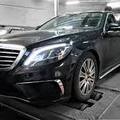If you have ever seen an online store full of laptops, you know that the specs of the product can make you feel overwhelmed in no time. There is no reason to make a hasty purchasing decision. Instead of letting negativity take over, use the following tips to help you understand laptops better.
Consider a touchscreen laptop. More and more software for PCs is being created with touchscreen technology in mind, meaning this option will become increasingly essential as time goes on. By purchasing the technology now, you can take advantage of the touchscreen features and not feel a necessity to re-buy another computer for several years.
Before you make a final decision, check to see if your potential laptop comes with a hard drive and RAM which can be upgraded in the future. You may need extra storage space and added speed later on. Should this be necessary, you can upgrade instead of a costly laptop replacement. Keep these things in mind before you purchase a new laptop.
If you are in the market for a budget laptop, around $400-600, know what to expect for that amount of money. The laptop will usually made of cheaper plastic, not as durable as some other materials. Your choice of colors may limited. A budget laptop will have a relatively small hard drive and installed memory.
If you typically only search the web, check email and handle small word processing tasks with your computer, consider purchasing a Netbook. These units are inexpensive and light to carry, but they are also limited in how they function. For the moderate user though, they offer a budget friendly option that is easy to travel with and gets the job done.
The LCD display drains the battery on your laptop. Make the screen dimmer for a longer battery life. Dimming your display will greatly increase the life of your battery.
Ample memory is imperative with a laptop. Technology and software advance rapidly and the key to keeping up is having a laptop that can maintain speed. Though you may not think you need multiple gigabytes of memory, or RAM, you will want it as time goes on. Don't be caught with a slow laptop that cannot keep up a year later.
Be sure to ask what comes with your laptop, new or used. For example, a new laptop may come with a charging cord, but it may be slow, intended for European outlets, or too short. If you know what you're getting, you won't be surprised when you pull it out of the box.
Choose a reputable brand when buying your new laptop. Your computer is only as strong as the brand name behind it, and you might find this out if you have to contact customer service for any reason. You want a company that honors the warranty it offers and assists you with updates or other needs too.
Don't buy laptops as an impulse buy. These are highly involved purchases that you really need to think about. Know what you want to use it for. Know how long you want it to last. Even know how often you expect to travel with it. All of these things should be considered in the buy.
Consider if your new laptop has bluetooth capabilities. This can come in handy if you want to attach an external mouse, keyboard or other accessory. While most computers come equipped with WiFi, bluetooth is not a guarantee. Look for it before making your purchase, and consider how useful it will be to you when selecting the price point you want to spend.
To keep your laptop from overheating, take a look at the cooling options inside the Control Panel. Once you are on the panel, look at Power Options. One of the choices should involve cooling. If your laptop gets too hot, make sure this settin s Active, so that the fan is in use.
Know the battery life. All laptops have batteries, but they are not all equal. When you are examining the laptop specs, take note of the battery. Know how long you will have when you go mobile. You may find some models have a very limited amount of time away from outlets.
Something that many people do not consider when buying a laptop is the noise. Some laptops have fairly noisy fans that can be a distraction. When buying your laptop, try your best to get it in a completely silent location so you can hear how loud the fan it. This is not something that you want to discover when you get home and start working.
When buying a laptop, you should be aware that you have fewer upgrade options later. PCs are typically very customizable. You can add components later. It is often a matter of popping away a side of the case and installing a new component. For laptops, this process is usually much harder, if even possible. Graphic cards, for instance, are not usually upgradable in a laptop.
Test the quality of the laptop latching system before making any purchase. The beauty of laptops is that they can fold up securely and become very portable. But if that latching system that holds the laptop closed is cheap, you may find that the screen and keyboard keys get ruined faster that you'd like.
When you've narrowed down your list of choices, be sure to check out complaints online. This can be done by using your model number along with the word "problem" in a search. You may find out that the monitor quickly deteriorates or that the power cord has to be tweaked to not fall out constantly.
It is important you do vent maintenance on your laptop at least once a week to make sure the vents are not blocked. Avoid pushing anything inside the air vents to clean them. The safest and simplest way to clean the vents is by spraying a can of air. You can buy these cans at any computer supply store.
It is easy to get a better understanding of laptops when you know where to look. This article has compiled some of the best and easy to understand tips online. Use what you have just learned to help you start your understanding of laptops and to make wise decisions when it comes to purchasing them.




